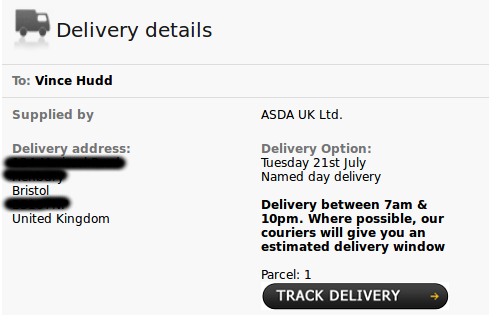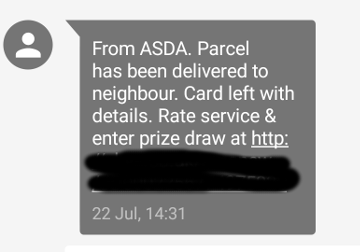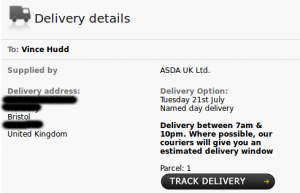Delivering danger to your (neighbour’s) door!
Back in July, I purchased some items online from Asda, and at the final step, when faced with the delivery options, I chose a ‘named day’ for delivery. This costs a small amount more than standard delivery, but it ensures that the delivery will take place on the specified day. It meant I could select a day on which I would be home all day, rather than have the goods arrive when I’m not in.
Well, that’s how it’s supposed to work in theory – but what about in practice?
Say hello to Yodel, the delivery company that Asda used.
Yodel are well known in the UK – perhaps elsewhere as well; I don’t know – and that’s not just because of their size and reach, but also because of their reputation. And on this occasion, they definitely matched what many people would expect of them.
The day before I expected delivery, I received an email from Asda to say my goods had been dispatched, detailing my delivery option – identifying my choice of date, and specifying that I had opted for ‘named day delivery’, with a note that delivery could be expected between 7:00am and 10:00pm. As I’ve said, I would be in all day on the day I’d selected – so far, so good.

There was also a link to track the delivery. I clicked it, and was taken to Yodel’s delivery tracking system, where I was told the delivery would be Wednesday – the day after the one I’d chosen on the basis I’d be in that day. A day on which I definitely wouldn’t be in all day.
I expected to be out from around 8:30am until around 3:00pm, so there was still a possibility that the delivery would happen when I was in – but it was impossible to say. So come 8:30, I set off to where I needed to be that day, and shortly after I arrived there and set up my computer, I noted that I’d received an email from Yodel themselves, saying my goods were on their way and I could expect to receive them by 9:00pm.
At 2:31, just as I was setting off for home again, I received a text message from Asda to say my goods had been delivered:

In the image of the text message above, I’ve blacked out the link to rate the service, because it was a link with a tracking code – but it’s worth noting that it was a link to the domain yhys.co.uk, which appears to belong to Yodel, not Asda, despite who the message purported to be from. For the avoidance of doubt, I did indeed leave some appropriate feedback!
I assume the card mentioned in the text message would have told me which neighbour the package had been left with – but when I actually arrived home (shortly after 3:00pm, as I expected) I discovered there was no card.
I soon found which neighbour the package had been left with and, as it happens, it was the first neighbour I checked, so I only had to knock on one door, and there was obviously no problem with the package going astray. However, the neighbour in question is elderly.
If you’ve read this carefully enough, you will see that there are three obvious cock ups – and if you read between the lines, you might spot a possible fourth:
Firstly, I paid Asda/George for delivery on a specific day, and Asda would have paid Yodel for delivery on that day. Yodel should therefore have delivered on that day. It’s not as if there was an unexpected delay, or problem on the day of delivery – the tracking information provided to me the day before my chosen delivery date told me it would come the day after that date. There was nothing in the tracking information that indicated any recognition whatsoever that it was therefore going to be late – so, obviously, that meant there was no explanation of why, and definitely no apology.
It’s worth noting that if that unexplained delay had not happened, the remaining two cock ups would also not have happened. The fourth, on the other hand – the possible cock up – might have.
Secondly, because the parcel was delivered on the wrong day, and I wasn’t in, the driver chose to leave it with a neighbour. Granted, the UK lockdown had been eased to a notable extent by this point – but the pandemic remains a current problem. And I’d hope Yodel’s delivery drivers would be taking suitable precautions to keep themselves and members of the public safe.
However, despite any precautions that may (or may not) have been taken, there is still a risk when one person interacts with another – in this case, the direction of risk is mostly from the delivery driver to the person or persons receiving the parcel, if Yodel are handling deliveries the same way as other companies I’ve received goods via. i.e. a no-contact method of placing a package on the doorstep, knocking the door and stepping back to await an answer and to confirm delivery has been made.
This delivery, don’t forget, was made to an elderly neighbour – someone who has to be especially careful.
Granted, they would have been receiving deliveries anyway, such as general groceries and, hopefully, those making the deliveries would have been taking all the precautions possible just in case – but the bottom line is that no matter what precautions are taken, there will always be a risk, even if it’s reduced to a very small one. Each individual delivery, therefore, brings with it a small risk – so the more deliveries there are, the more risks are taken.
The risk is increased further still because leaving the parcel with the neighbour meant there was one further interaction, when I retrieved the parcel from them. Although, when playing pass the parcel like this, if there’s an infection risk, that risk increases for each person further down the line – so even if it wasn’t an elderly, and therefore vulnerable neighbour, simply putting the parcel in an extra pair of hands before it reached mine increased the risk to me.
To be fair to the driver, this is actually Yodel policy. Until the neighbour answered the door there was no way the driver could know they were elderly – and that goes in spades for whoever thought that would be an appropriate procedure; the company undertakes countless deliveries every day, and any number of them could happen when the recipient isn’t home – especially if the delivery doesn’t happen on the day paid for – so how many elderly people have been given that little bit of extra exposure as a result?
The flip side to that, of course, is that holding packages for collection or re-delivery has to be administered, and the more that happens, the more administration is needed… but even as I try to see this from Yodel’s point of view, I immediately think back to the fact that I opted (and paid) for named day delivery, and without any explanation whatsoever, Yodel delivered a day late.
Thirdly, the lack of a card indicating which neighbour had the parcel is a problem. As it happens, I got the right neighbour the first time – but if I hadn’t, I would then have tried a different neighbour, and then possibly another… each time, the risk both to me and each of those neighbours being increased; them from me, me from them.
That missing card is also the possible fourth problem – this time unrelated to the pandemic. Whenever a parcel can’t be delivered directly to its intended recipient, whether it’s left with a neighbour, returned to the depot to be collected, or so delivery can be attempted another day, there should definitely be a card – and the message I received to say the parcel had been delivered did say a card had been left.
So where was it? That there wasn’t one made me consider the possibility that, just maybe, the delivery driver had tried to deliver to the wrong address. Did another neighbour have a card for a missed delivery that was intended for me?


